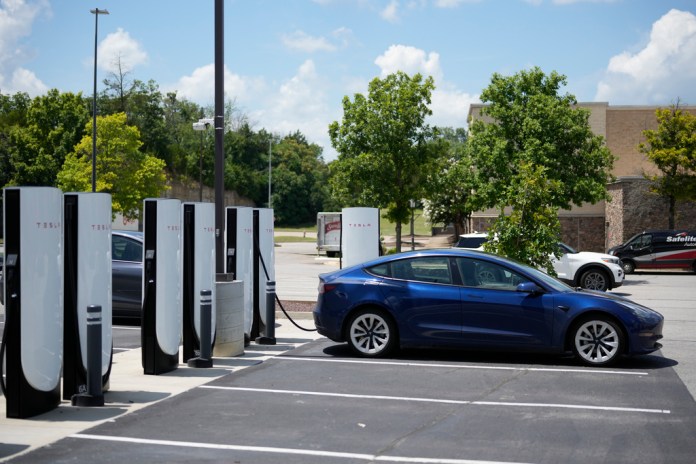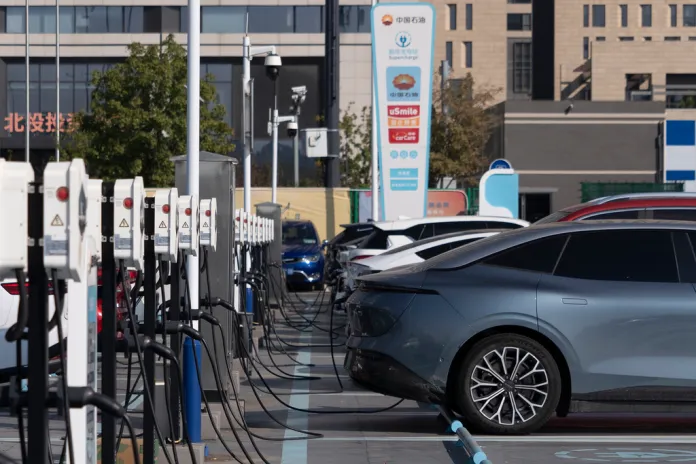‘Alarming’ Fire Hazard Warning Issued for EVs in Milton Aftermath
Florida’s State Fire Marshal, Jimmy Patronis, has issued a warning about the fire hazards posed by electric vehicles (EVs) that have been exposed to saltwater due to recent hurricanes. Following Hurricane Helene, which resulted in 48 fire incidents linked to lithium-ion batteries—11 of which involved EVs—Patronis described these vehicles as “ticking time bombs.” He urged residents to remove flooded EVs from their homes to prevent potential fires and recommended parking them in open areas away from structures.
Patronis has been vocal about the dangers since the aftermath of Hurricane Ian, citing the risk of lithium-ion battery fires from vehicles that have been submerged. He highlighted that EV manufacturers must do more to inform customers about the necessity of safeguarding their vehicles before hurricanes or flooding occur.
Experts emphasize that the safety measures in place for gasoline-powered vehicles have been refined over decades, while EV safety protocols are still in development, leading to heightened concerns following weather-related incidents. The National Highway Transportation Safety Agency has previously indicated that saltwater can compromise battery integrity, potentially leading to fires even weeks after initial exposure.
Florida’s state fire marshal is warning that “ticking time bombs” in the form of electric vehicles will litter the state in the aftermath of recent hurricanes.
Chief Financial Officer and State Fire Marshal Jimmy Patronis had initially issued his warning in connection with Hurricane Helene, calling the risk of EV fires due to salt water flooding “alarming.”
On Wednesday, as Hurricane Milton prepared to wallop the state, he noted that Helene was linked to 48 fires caused by lithium-ion batteries, with 11 from EVs, according to WFTS-TV.
“As I’ve stated before, these compromised vehicles and devices are ticking time bombs and my office will continue to coordinate with federal, state, and local officials to ensure consumers and first responders are aware of these fire hazards following Hurricane Milton,” he said.
Floodwaters can submerge electric and hybrid vehicles, creating electrical hazards and potential fires days or weeks later. Saltwater flooding can cause damage to your electric vehicle’s battery. pic.twitter.com/yVOOde9sET
— Sarasota County Government (@SRQCountyGov) October 9, 2024
“After the storm, if you do have an EV that has been flooded by saltwater and it remains in your garage or near your home, please remove it immediately to a safe location, so that you can worry about fixing your home, instead of rebuilding it due to fire,” he said.
In a statement on his website, Patronis said any vehicle with a lithium-ion battery that has been under salt water should be parked in an open space to avoid damage to a building if a fire erupts.
He also said owners should disconnect the battery and not attempt to charge the vehicle.
“[P]lease unplug the vehicle or device, and move it safely away from your home or apartment into a clear open space,” he said in his initial warning.
Patronis said EV makers need to do more to warn customers that they need to get their vehicles out of harm’s way before a hurricane or other ocean flooding event takes place.
“We’ve seen it: They’ve exploded. They’ve caused fires,” said Cathie Perkins, Pinellas County’s emergency management director, according to The Washington Post.
“If it’s inside of your home or underneath a condo, we do not need to have building fires in the middle of this because nobody’s going to be able to come out and help you,” she said.
Alan Taub, director of the Electric Vehicle Center at the University of Michigan, said electric vehicle safety is still in its early stages, according to The New York Times.
“We’ve had 100 years to refine the safety of gasoline-powered vehicles, and we’re a little over a decade in terms of high-volume production of EVs,” he said. “Events are rare, but they catch a lot of attention.”
Patronis has been sounding the alarm about the dangers of lithium-ion batteries after they are immersed in salt water since 2022.
After Hurricane Ian pummeled the state, Patronis said he witnessed an electric vehicle reignite multiple times.
At that time, the National Highway Transportation Safety Agency warned that salt water damages batteries and that “[l]ithium-ion battery fires have been observed both rapidly igniting and igniting several weeks after battery damage occurred.”
The agency said the timing depends on multiple factors, including the battery design and chemistry, plus the amount of damage the battery has suffered.
Advertise with The Western Journal and reach millions of highly engaged readers, while supporting our work. Advertise Today.
" Conservative News Daily does not always share or support the views and opinions expressed here; they are just those of the writer."




